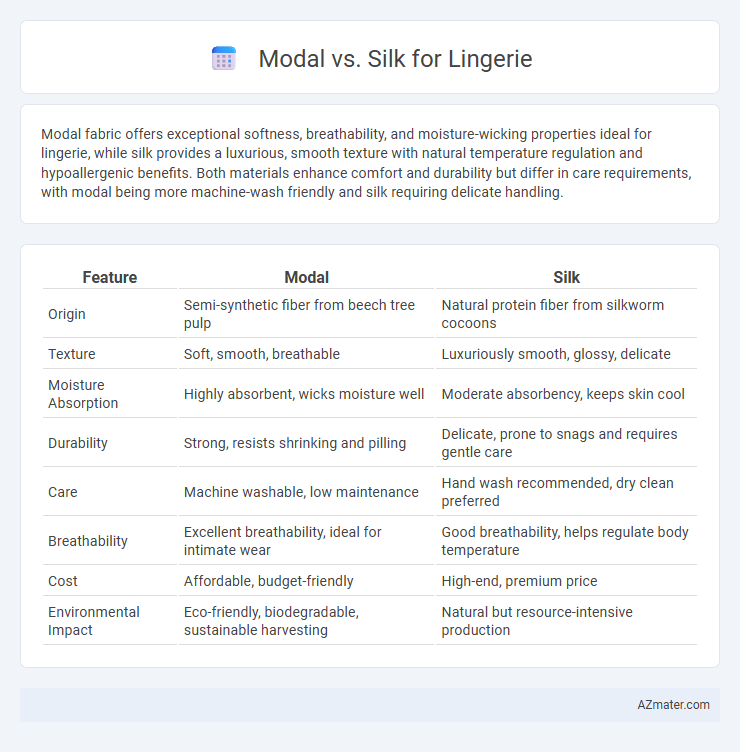Modal fabric offers exceptional softness, breathability, and moisture-wicking properties ideal for lingerie, while silk provides a luxurious, smooth texture with natural temperature regulation and hypoallergenic benefits. Both materials enhance comfort and durability but differ in care requirements, with modal being more machine-wash friendly and silk requiring delicate handling.
Table of Comparison
| Feature | Modal | Silk |
|---|---|---|
| Origin | Semi-synthetic fiber from beech tree pulp | Natural protein fiber from silkworm cocoons |
| Texture | Soft, smooth, breathable | Luxuriously smooth, glossy, delicate |
| Moisture Absorption | Highly absorbent, wicks moisture well | Moderate absorbency, keeps skin cool |
| Durability | Strong, resists shrinking and pilling | Delicate, prone to snags and requires gentle care |
| Care | Machine washable, low maintenance | Hand wash recommended, dry clean preferred |
| Breathability | Excellent breathability, ideal for intimate wear | Good breathability, helps regulate body temperature |
| Cost | Affordable, budget-friendly | High-end, premium price |
| Environmental Impact | Eco-friendly, biodegradable, sustainable harvesting | Natural but resource-intensive production |
Introduction to Modal and Silk Fabrics
Modal fabric, made from beech tree cellulose, offers exceptional softness, breathability, and moisture-wicking properties ideal for lingerie. Silk, a natural protein fiber produced by silkworms, is renowned for its luxurious smooth texture, natural temperature regulation, and hypoallergenic qualities. Both fabrics excel in comfort and elegance, making them popular choices for intimate apparel.
Brief History of Modal and Silk in Lingerie
Modal fabric, developed in the 1950s from beech tree cellulose, gained popularity in lingerie for its smooth texture and moisture-wicking properties, enhancing comfort and durability. Silk, used in lingerie since ancient times, has been prized for its natural sheen, softness, and temperature-regulating qualities, symbolizing luxury and elegance. Both materials have evolved to meet modern demands, with Modal offering sustainable benefits and silk maintaining its classic appeal in intimate apparel.
Texture and Feel: Modal vs Silk
Modal lingerie offers a soft, smooth texture with a breathable, moisture-wicking feel that enhances comfort during extended wear. Silk lingerie provides a luxurious, naturally glossy texture that feels cool and sensual against the skin, ideal for a lavish touch. Both fabrics excel in softness, but Modal is prized for durability and practicality, while Silk is favored for its elegance and lightweight drape.
Breathability and Comfort Comparison
Modal fabric offers superior breathability and moisture-wicking properties, making it highly comfortable and ideal for lingerie worn in warm climates. Silk, while luxurious and smooth against the skin, provides moderate breathability but excels in temperature regulation, keeping the wearer cool in summer and warm in winter. When comparing comfort, modal's softness and stretchability often outperform silk's delicate texture, especially for everyday lingerie use.
Durability and Longevity of Each Fabric
Modal fabric offers superior durability and retains softness even after multiple washes, making it a popular choice for lingerie that requires long-lasting comfort. Silk lingerie, while luxurious and naturally breathable, tends to be more delicate and prone to wear, requiring gentle care to maintain its longevity. Comparing both, modal stands out for resilience and resistance to shrinkage or pilling, whereas silk demands more careful handling to preserve its elegant texture and durability over time.
Care and Maintenance: Modal vs Silk
Modal fabric offers exceptional durability and is machine washable, making lingerie care straightforward and low-maintenance. Silk lingerie requires delicate hand washing or dry cleaning to preserve its natural fibers, demanding more careful handling and specialized care products. Choosing Modal ensures long-lasting softness with minimal effort, while Silk demands meticulous maintenance to avoid damage and maintain its luxurious feel.
Eco-Friendliness and Sustainability
Modal fabric, derived from sustainably sourced beech trees, offers excellent eco-friendliness due to its biodegradable nature and lower water consumption during production compared to traditional materials. Silk, a natural protein fiber from silkworms, is biodegradable but involves intensive resource use and ethical concerns related to silkworm cultivation. Choosing modal for lingerie prioritizes sustainability through renewable raw materials and a smaller environmental footprint, while silk provides luxury but with higher ecological costs.
Cost and Affordability Factors
Modal lingerie offers a cost-effective alternative to silk, with prices generally 30-50% lower due to its semi-synthetic cellulose fiber production process. Silk, derived from silkworm cocoons, commands a premium price influenced by labor-intensive harvesting and natural material costs. The affordability of modal makes it a popular choice for budget-conscious consumers seeking soft, breathable lingerie without compromising on comfort.
Style, Color, and Design Options
Modal fabric offers a smooth, lightweight feel with excellent breathability, making it ideal for lingerie featuring vibrant colors and modern, sleek designs. Silk provides a luxurious, natural sheen and a softer, more elegant texture, often preferred for classic styles with rich, deep hues such as burgundy, emerald, and midnight blue. Both materials allow diverse design options, but Modal suits everyday sporty or casual lingerie while Silk excels in sophisticated, high-end pieces emphasizing glamour and sensuality.
Choosing the Best Fabric for Your Lingerie
Modal lingerie offers exceptional softness, breathability, and moisture-wicking properties, making it ideal for everyday comfort and durability. Silk lingerie provides a luxurious feel, natural hypoallergenic qualities, and a smooth texture that enhances sensuality and elegance. Choosing between modal and silk depends on preferences for performance and ease of care versus opulence and delicate maintenance.

Infographic: Modal vs Silk for Lingerie
 azmater.com
azmater.com